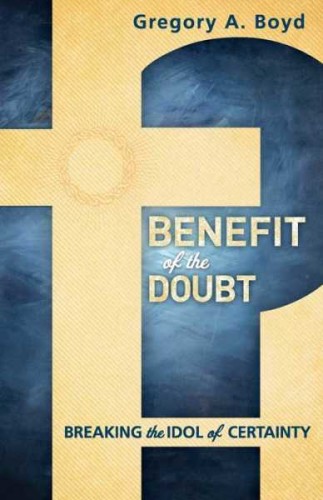Benefit of the Doubt
 In Benefit of the Doubt, influential theologian, pastor, and bestselling author Gregory Boyd invites readers to embrace a faith that doesn’t strive for certainty, but rather for commitment in the midst of uncertainty. Boyd rejects the idea that a person’s faith is as strong as it is certain. In fact, he makes the case that doubt can enhance faith and that seeking certainty is harming many in today’s church. Readers who wrestle with their faith will welcome Boyd’s message that experiencing a life-transforming relationship with Christ is possible, even with unresolved questions about the Bible, theology, and ethics. Boyd shares stories of his own painful journey, and stories of those to whom he has ministered, with a poignant honesty that will resonate with readers of all ages.
In Benefit of the Doubt, influential theologian, pastor, and bestselling author Gregory Boyd invites readers to embrace a faith that doesn’t strive for certainty, but rather for commitment in the midst of uncertainty. Boyd rejects the idea that a person’s faith is as strong as it is certain. In fact, he makes the case that doubt can enhance faith and that seeking certainty is harming many in today’s church. Readers who wrestle with their faith will welcome Boyd’s message that experiencing a life-transforming relationship with Christ is possible, even with unresolved questions about the Bible, theology, and ethics. Boyd shares stories of his own painful journey, and stories of those to whom he has ministered, with a poignant honesty that will resonate with readers of all ages.
Greg’s story behind the writing of Benefit of the Doubt
For several decades I found myself increasingly bothered by the nature of “faith.” Like most other contemporary Christians, I always assumed a person’s faith was a strong as they were free of doubt. What troubled me was that, on most matters, my faith had never been doubt free. Even worse, I couldn’t see why my faith should be free of doubt. What is so virtuous about the ability not to doubt? What is so praiseworthy about feeling certain that your beliefs are right?
On top of this, my years in ministry, both as a pastor and as a University professor, had given me the insight that this understanding of faith tends to make people narrow minded and intolerant. If a person believes that God rewards you if you don’t doubt your beliefs, they will understandably tend to view differing perspectives as a threat and will not be able to honestly consider them or rationally debate them. And finally, I wondered why it is that none of the “heroes of faith” in Scripture ever try to make themselves feel certain of their beliefs. To the contrary, most of these “heroes” went through periods where they honestly express doubt, in which they question, and sometimes even accuse, God. And yet they are held up as heroes. The biblical narrative simply doesn’t give the impression that God places a premium on certainty.
For these reasons, I was tremendous relieved when, in the course of my on-going studies, I came to realize that the nature of biblical faith is very different from what I and most westerners had assumed was the nature of faith. Whereas contemporary westerners tend to think of faith as a psychological concept, the characters of the Bible thought of faith as a covenantal concept. And while the psychological concept motivates people to think in ways that promote psychological certainty, the biblical model motivates people to commit to a relationship and a way of life in the midst of uncertainty. That is precisely why it is called “faith”!
As I began to share these ideas in the pulpit, classroom and blogs, the feedback I got was overwhelming. Numerous people told me these ideas explained a multitude of questions they had struggled with and greatly energized their walk with God. Some told me that the biblical conception of faith set them free to think and question without guilt for the first time in their life! I soon came to the conclusion that these ideas should be disseminated as broadly as possible, which is why I wrote Benefit of the Doubt.
By the way, I had to take a break from a book I’d already been working on for five years to write Benefit of the Doubt. I initially thought it would be completed in three months or so. As is typical for me, it took three times that long! Also as an aside, the book I took a break from, The Crucifixion of the Warrior God, also was supposed to be completed in a single summer. At the time I am writing this background story, it has been nine years and its still not complete! And, as a final (and hilarious) aside, to embark on Crucifixion of the Warrior God, I had to take a break from a previous book that I had been working on for several years, entitled The Myth of the Blueprint – which is now 14 years overdue! My planning skills suck!
